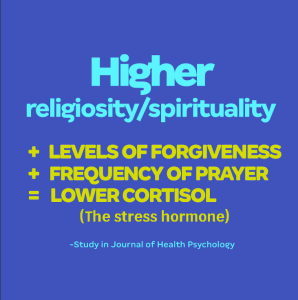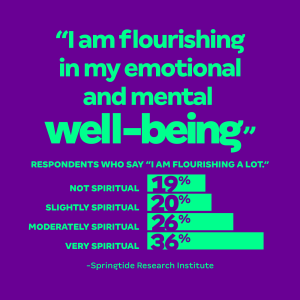The positive interrelatedness between spiritual practice and mental health has been widely studied and recognized in various cultures and religions across the world. Here are some key points highlighting this connection:
1. Stress Reduction
Spiritual practices often involve mindfulness, meditation, and prayer. Engaging in these activities can significantly reduce stress levels. Regular practice trains the mind to be calm and focused, reducing the production of stress hormones.
In Islam, it is stated in the holy Quran,
“those who believe and whose hearts find comfort in the remembrance of Allah. Surely in the remembrance of Allah do hearts find comfort.” Quran (13:28)
2. Enhanced Emotional Well-being
Spiritual practices encourage self-reflection and acceptance. This process helps individuals understand and manage their emotions better, leading to improved emotional well-being. It promotes feelings of gratitude, compassion, and forgiveness, which are vital for mental health.
Islamic teachings encourage believers to engage in deep self-reflection (Tafakkur) and seek forgiveness from Allah (Tawbah). Through introspection, individuals evaluate their actions and intentions, fostering a profound sense of self-awareness. Acceptance of one’s flaws and the decree of Allah leads to inner peace and contentment which are fundamental to emotional stability.
3. Sense of Purpose
Many spiritual traditions emphasize the importance of a purpose-driven life. Having a sense of purpose gives people a reason to live, motivates them, and provides a framework for making life choices. It can act as a buffer against mental health issues like depression and anxiety.
What is your purpose? Watch here:
4. Community Support
Spiritual communities often provide a strong social support system. Belonging to such a community reduces feelings of isolation and alienation which can be common triggers for mental health disorders.
In Islam, believers are considered members of a larger spiritual family, the Ummah. This community provides a vital support system, emphasizing the concept of brotherhood and sisterhood. Being part of a spiritual community reduces feelings of isolation (Ikhtilat) and alienation (Khawf) that individuals might experience while facing life’s challenges. The sense of belonging within the Ummah ensures that no believer is left alone to face their struggles. Fellow community members are there to offer understanding, and practical help, mitigating the emotional distress caused by isolation.
The life of Prophet Muhammad serves as a model for community support and camaraderie. He established a cohesive community in Medina, where members supported each other emotionally, socially, and economically. The companions of the Prophet demonstrated unparalleled unity and solidarity, setting an example for future generations to emulate.

5. Coping Mechanism
Spirituality offers coping mechanisms during difficult times. Faith and spiritual beliefs can provide comfort and hope, helping individuals navigate challenges such as illness, loss, or trauma. This coping mechanism can prevent the development of severe mental health disorders.
Islamic faith teaches believers that every trial and tribulation is a test from Allah. With unwavering trust in divine wisdom, Muslims find solace in the belief that challenges, no matter how overwhelming, are part of a greater plan. This perspective offers a profound sense of comfort, as individuals are encouraged to surrender their anxieties to Allah, finding reassurance in His mercy and guidance.
Islam places immense importance on patience (Sabr) in the face of hardships. Believers are taught that enduring difficulties with patience and perseverance are not only virtuous but also rewarded by Allah. This hopeful outlook enables individuals to maintain their emotional equilibrium during trying times, knowing that their steadfastness is pleasing to Allah and will be rewarded in this life or the Hereafter.
6. Positive Lifestyle Choices
Many spiritual teachings advocate for a balanced and healthy lifestyle. This includes proper nutrition, regular exercise, and abstaining from harmful substances. These lifestyle choices directly impact mental health and contribute to overall well-being.
Islamic dietary laws prescribe the consumption of Halal (permissible) and Tayyib (pure and wholesome) foods. Muslims are encouraged to consume foods that are clean, healthy, and beneficial for the body. The emphasis on Halal and Tayyib foods not only ensures physical health but also purifies the soul, promoting a sense of cleanliness and well-being. A nutritious diet directly influences brain function and energy levels, impacting mood and cognitive abilities, which are crucial for mental health.
Islam strictly prohibits the consumption of harmful substances, including alcohol and recreational drugs. Such substances not only harm the body but also impair judgment and mental clarity. By abstaining from these harmful substances, individuals maintain their physical health, mental acuity, and emotional stability. Clarity of mind enables better decision-making and fosters a positive mental state.
7. Improved Relationships
Spiritual practices often promote qualities like empathy, kindness, and forgiveness. When individuals cultivate these traits, their relationships tend to be more fulfilling and harmonious. Positive social interactions are linked to better mental health outcomes.
In Islam, the teachings regarding interpersonal relationships are comprehensive and detailed, guiding believers on how to interact with others in a manner that is compassionate, and respectful. These teachings encompass various aspects, including how to maintain relationships with one’s spouse, neighbors, and friends, and even how to deal with toxic people.

8. Self-Transcendence
Spiritual experiences can lead to self-transcendence, where individuals feel connected to something greater than themselves. This expanded sense of self can lead to a profound shift in perspective, reducing egocentrism and promoting mental well-being.
In summary, People often find solace, meaning, and resilience in their spiritual beliefs and practices, which play a significant role in promoting their mental health and overall quality of life. You can also find a study done by Skylight highlighting the effects of daily spiritual self-care in relation to mental health.














